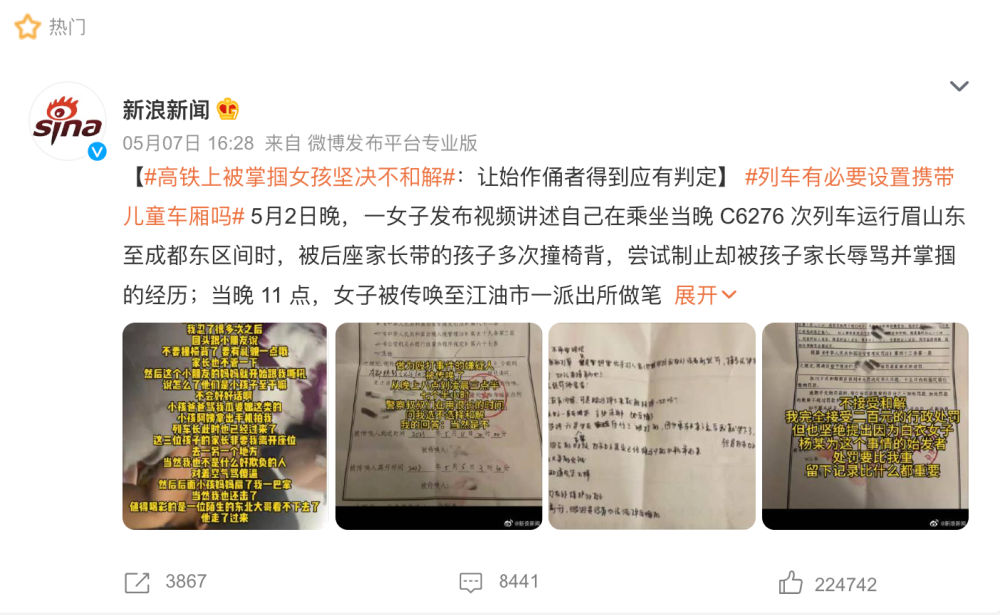An argument between two female passengers on a Chinese high-speed train has recently attracted a lot of attention on Chinese social media.
The incident, which has been dubbed “the high-speed rail slapping incident” (“高铁掌掴事件”), happened on the C6276 train on May 2, 2023, between Meishan East Railway Station and Chengdu East Railway station.
Two female passengers seated on the train got into an argument after one woman (Wang 王) got angry over the other woman’s children kicking against the back of her seat. She turned around and scolded them, after which the mother (named Yang 杨) got upset. Both women took their phones and argued while filming each other.
The situation soon escalated from there, and the argument turned physical when Yang first slapped Wang in her face. Several videos of the incident that have since gone viral show that Wang then also slapped Yang in the face, and did it again shortly after.
Train staff and other passengers tried to mediate the situation and calm the women down. One man in specific raised his voice to mediate, while also condemning the parents for not correcting their children’s behavior.
Wang posted about the incident on social media on the night of May 2nd, and it has blown up since then.
Wang was later summoned to the police station and reportedly was fined 200 yuan ($30) by the police for her role in the incident. On the night of May 4th, Wang arrived at the police station at 8 pm, and did not leave until 3.30 am.
In a video posted online, the woman explained that she refused to reconcile with the other party, insisting that they should receive the appropriate punishment for their actions (#高铁上被掌掴女孩坚决不和解#). She said she would accept the fine she received, but stressed that the party that initiated the fight should be punished more harshly.
“To give each one a flogging of fifty strokes” (各打五十大板)
One of the main reasons why the case became so big is because the incident was ruled as “mutual assault” (hù’ǒu 互殴). On Chinese social media, many netizens express that the judgement is not correct since Yang was the first to attack and Wang defended herself (zhèng dàng fáng wèi 正当防卫).
The issue of self-defense being ruled as a ‘mutual assault’ is a recurring one in Chinese social media discussions. A popular opinion is that the police often rule something as ‘mutual assault’ to just settle the matter and be done with it. This is also referred to as gè dǎ wǔshí dà bǎn (各打五十大板), a Chinese idiom that translates to “each person gets a flogging of fifty strokes,” meaning the guilty and innocent are being punished in the same way.

One post about the issue by Sina News received nearly 225,000 likes on Weibo.
Since the slapping incident continued to trigger discussions online, the Chengdu Railway Police issued a statement on May 10, in which they provided exact details on how the incident unfolded. They concluded that both parties were guilty of assault, and that Wang had received the 200 yuan ($30) fine while Yang had received an administrative penalty of 500 yuan ($72).
Still, many people feel that punishing the instigator as well as the person who strikes back is not fair, since it allegedly prevents people from trying to defend themselves.
“The woman who was beaten showed great perseverance,” one person commented: “Hopefully, this case can serve as a milestone event, thoroughly correcting the society’s long-standing habit of taking this approach [of ruling it as ‘mutual assault’] to smooth things over.”
In 2020, Jeremy Daum at China Law Translate published an article about self-defence and on how cases related to the right to protect oneself can evoke passionate public responses. The article describes how then-released guidelines help authorities navigate cases involving the right to protect oneself and the determinations of when such a defense is justified.
As Daum points out, one remarkable feature of the 2020 guidelines is their explicit concern for public opinion. In light of some cases triggering massive public debates, the guidelines call for greater transparency in explaining the law to the public and on how verdicts are reached.
The 2020 guidelines are evident in this specific ‘train slapping incident,’ as it is clear that the reason for penalizing both parties was clearly communicated to the public as the incident went trending online.
“Brat children” (熊孩子)
Another reason why this particular incident received so much attention has to do with the issue of so-called “brat children.” In Chinese, they are referred to as xióng háizi (“熊孩子”), which literally means ‘bear children’ and is used to describe unruly, naughty children (often boys) who are prone to cause trouble.
In The Historical Dictionary of Chinese Culture (Sullivan & Sullivan 2021), it is explained that the rise of the “xióng háizi” phenomenon in China during the 2000s was due to the prevalence of a parenting style known as “soft-touch parenting.”
This approach to parenting was significantly different from previous decades and emphasized gentle and nurturing methods. As a result, many of these children, who are often only children who are pampered by doting grandparents, developed a reputation for their disruptive and self-absorbed behavior in public places (p. 130).
The behaviour of these “little brats” often makes headlines. Like the time when security cameras captured how a young boy urinated in an elevator and broke it, or when a little kid crashed and destroyed a Lego sculpture within an hour after it was displayed in a Chinese mall.
Many commenters on social media say that they have had it with these “little brats” and their parents. In one of her social media posts, Wang argued that there should be designated carriages for passengers traveling with children on high-speed trains to avoid bothering other passengers.

Brat children on the train (via
Regarding the incident, many people believe that the intensity of the argument was due to the fact that people have become increasingly intolerant of unruly children and their parents who fail to discipline them. Although Wang also slapped Yang, many people still side with her, saying they understand her frustrations and supporting her right to criticize the children and their parents.
One commenter (@陌川_MC) writes: “Lots of things are happening every day, yet why do we always see incidents involving ‘brat children’ pop up in the trending lists? The basic reason is that it strikes our travel pain point: we constantly get annoyed by little brats. Behind every ‘bear child’ there is a ‘bear parent.’ People are very disgusted with such parents, but can not do anything about it, which is why they cannot help but feel indignant when they see these types of incidents happening.”
“I was on a high-speed train for three hours yesterday, and all of these three hours a brat child was crying. Didn’t it wear him out? Even I was exhausted by listening to his cries, and the train attendants didn’t do anything about it.”
The hashtag “Should Trains Set Up Special Carriages for Children” (#列车有必要设置携带儿童车厢吗#) received comments from many people who applaud the idea.
“Dongbei Brother” (东北大哥)
One of the other reasons why the train slapping incident has become such a big topic is due to the role played by one of the passengers who stepped in and ‘mediated’ during the fight. As he comes from Northeast China, the man has now come to be known simply as the ‘Dongbei Brother’ or ‘Northeastern big brother’ (东北大哥).
During the incident, the man came up and meddled in the argument. Although ‘Dongbei Brother’ has become an online celebrity, netizens also accuse him of taking sides during the altercation, labeling the child as a troublemaker and completely ignoring the fact that Wang was filming the children and yelling at them.
Others suggest he only intervened to gain attention for himself and increase his social media following.

The man approaching in the yellow jacket is “Dongbei brother.”
In response to these accusations, then man said on a recent livestream that he only stepped in because he saw the two parties arguing and wanted to prevent the altercation getting any worse. The man also stated that he received a call from the child’s mother, thanking him for his intervention. Neverthless, in light of all the negative comments he received, he also stated that he would not intervene in similar situations in the future. That topic also went trending (#东北大哥称不想再管吵架事件#), receiving 180 million views on Friday.
Some people took the backlash against ‘Dongbei Brother’ as a lesson, suggesting that it might be wiser to avoid intervening in these types of disputes altogether.
Lastly, the recent incident not only sparked discussions on the issue of “mutual assault” and “brat children,” as well as the role of those who intervene, but it has also shed light on the issue of cyberbullying. The individuals involved in the incident have all faced online abuse, highlighting the harmful impact of cyberbullying.
Despite all the people who have strong opinions about the incident and the various people involved, there are also those calling on netizens to stay reasonable above all else. After all, the best thing people can do to set the right example for so-called “brat children” is to try and stay civilized online.
By Manya Koetse, with contributions by Miranda Barnes
Get the story behind the hashtag. Subscribe to What’s on Weibo here to receive our newsletter and get access to our latest articles:
References
Daum, Jeremy. 2020. “Standing your ground, China Style.” China Law Translate, October 5 https://www.chinalawtranslate.com/en/standing-your-ground-china-style/ [May 12, 2023].
Sullivan, Lawrence R. and Nancy Sullivan. 2021. Historical Dictionary of Chinese Culture. New York and London: Rowman & Littlefield
Spotted a mistake or want to add something? Please let us know in comments below or email us. First-time commenters, please be patient – we will have to manually approve your comment before it appears.
©2023 Whatsonweibo. All rights reserved. Do not reproduce our content without permission – you can contact us at info@whatsonweibo.com.
The post Why a “High-Speed Train Slapping Incident” Went Viral on Chinese Social Media appeared first on What's on Weibo.